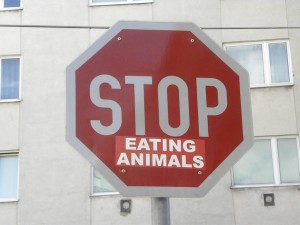
Photo Credit: sarahamina via Compfight cc
While there appears to be a growing number of strategies to water down veganism. There comes a time when these ridiculous myths need to be set straight.
Lest they become an internet “fact”.
Reducing To Zero
There is the mistaken belief doing the rounds at the moment that if we reduce enough, we will end up at zero.
The rise in vegan suitable products is often used as proof that the end game is near.
Unfortunately for the animals, this claim couldn’t be further from the truth, even if we gave it a GPS.
It’s All About Assumptions
For the reducetarian method to work far too many assumptions are made.
- That the animal agricultural industry will sit back and let this happen.
- Having a large number of products available more people will be inclined to try them.
- Those who start on the reducetarian path, continue on it continually reducing, rather than stopping or retreating.
- That reductionism is the only means by which people will become vegan.
Reality Is Somewhat Different
When they are realistically and logically considered, these assumptions are easily seen through.
The first thing that we realise is that the animal agricultural industry is not going to sit back and let this happen without some sort of counter-movement.
We have see then in Australia with Meat and Livestock Australia’s Bettertarian and Target 100 campaigns.
There has also been a “Free Meat Week” to counter the “Meat Free Week” campaign
How about the ads featuring:
- Sam Kekovich
- Lawrie Laurence
- Merrick Or Russo (I don’t know who’s who)
- Sam Neil
- Richie Benaud
How someone could honestly think that there won’t be some sort of counter campaign is beyond me.
The Industry Won’t Accept Losing Their Customers
To the animal agricultural industry, the ethical vegans are a write-off, a customer that they won’t get back. This is because the person has an ethical reason for going vegan, and nothing they can say will change that.
Whereas the reducetarians on the other hand, are still using their ‘product’, just not using it as much.
This would be where the Bettertarian and Target 100 campaigns come in. To target those who have reduced their meat consumption due to the treatment of animals, the environment or even for health.
Remember way back when eggs were bad? Then suddenly they got the Heart Foundation “tick” and are now good. Or how about the CSIRO’s “Total Wellbeing Diet”?
Paradox Of Choice
If the market is flooded with plant based alternatives, there is no evidence to indicate that simply having other products available will lead consumers to buy them.
In fact, the opposite is true.
Unless the consumer has a compelling reason to purchase the plant based product, they will traditionally stick with the familiar animal based products.
Reducetarian Has Nothing To Do Veganism
The “reducetarian movement”, as founded by Brian Kateman, does not have an end goal of veganism or vegetarianism for that matter.
This he makes that very clear.
Reducetarianism is about reducing one’s consumption of meat.
That’s it.
Nothing more and nothing less.
The Path Is Rough And Steep
The stressors that lead people to change their behaviour can be identified as one of two. Either they are motivated to move away from pain. Or they are motivated to move towards pleasure.
Unless there is a constant reminder of what they are moving away from/towards, the chances of a consumer reducing to zero is low.
Have a look at the stats for those who follow through or break their new year’s resolutions.
With the reducetarian message, the temptation to fall off the wagon is always there. Reducatarianism focuses on the size/amount of the item consumed, rather than the act of consumption.
There Should Only Be One Message
If you want someone to go vegan, tell them that.
Give them a compelling reason as to why they should, and more often than not they will.
To clarify here, I am talking about a compelling reason for them, not you the person talking to them.
The reducetarian strategy focuses on the person doing the reducing, allowing them to stop and start whenever they feel uncomfortable or that it is too hard, etc. This also takes the focus away from the animals which was the reason for them “reducing” in the first place.